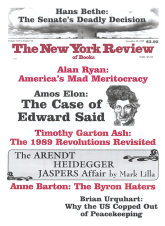In response to:
The Enigma of Erik Erikson from the June 24, 1999 issue
To the Editors:
I believe that I can cast some light on at least one aspect of what Howard Gardner calls “The Enigma of Erik Erikson” [NYR, June 24].
Sometime about 1970 Erik and Joan Erikson retired to live in an attractive home high on the hillside above Tiburon, California. One year as I taught my annual seminar on Kierkegaard at the Graduate Theological Union in Berkeley, a certain Joan Erikson showed up on the student list. But I did not make the association, and she sat quietly in the back row of a class of about twenty-five. Toward the end of the term, she stopped after class and introduced herself, and said that her husband, Erik, would like to talk with me because he had accepted an invitation to spend a Saturday talking about Kierkegaard with members of the local Episcopal church which they attended. I was quite flabbergasted, but recovered to say that I would be honored.
The upshot was that my wife and I were invited several times to have dinner with them, and Erik invited me to spend that Saturday with him as a respondent because he felt so unsure about Kierkegaard’s theology. During those days and in our friendship that followed, I learned many fascinating things about his life and about his thought.
One of the most interesting things he told me was that his mother, Karla, a native of Denmark, was an avid and continuous reader of Kierkegaard. And she would often stop and read passages aloud to young Erik. Being a native Dane himself and with a Danish Protestant as his biological father, and having been exposed to the most influential of all Danish writers, he also continued reading Kierkegaard from time to time.
My point is this: those who claim that Erikson deliberately obscured his Jewish heritage, and argue that by changing his name from Homburger to Erikson wrongly “implied he was a Christian,” are simply mistaken (see Gardner’s article, p. 54). The heritage that shaped his mind and heart in their most formative years was not Jewish but the writings of a profoundly Christian theologian, SÌüren Kierkegaard, as read to him by his own Jewish mother. Little wonder that as a youth in Germany he “formally broke off relations with the rabbi at the local synagogue…[and] began to study the Christian Gospels” (Gardner, p. 51). And it is not surprising that, according to Gardner, one of the four main motifs of Erikson’s work is “the centrality in human life of a ‘sense of identity’—the construction of a self that makes sense for the particular individual” (p. 53). A concept of the self is the unifying theme of all of Kierkegaard’s writings, and the Danish philosopher/theologian flatly stated, “My category is the individual.” Obviously, Erikson found much of interest in Kierkegaard as he (Erikson) continued to develop in his calling as a psychoanalyst, since Kierkegaard openly labels two of his major works as “psychological” studies (The Concept of Angst [Dread, Anxiety] and The Sickness unto Death). Erikson told me that he admired Kierkegaard as a thinker because “he never argues toward a conclusion” but follows the truth wherever it would lead him.
One final note. During one of our conversations, I asked Erik if his current interest in Kierkegaard meant that he was about to undertake a new psychohistory of the Dane to join those of Luther and Gandhi. First, he said he did not like the term “psychohistory,” because he did not think it accurate. I was too timorous to press him as to why. But then Joan said rather heatedly that, no, there would be no volume on Kierkegaard. She explained that when Erik writes such a study, the object of the study moves into their home and becomes a member of the family, day and night, and for all the months of the writing, as Erik would hold conversations with and about Luther or Gandhi. And she could not stand living with Kierkegaard so intimately for that long a period! The women in my seminars would always get incensed at Kierkegaard’s very traditional masculine views of women, their mind-sets and their role in society (even though some of his actual psychotheological statements about gender differences are remarkably free of that prejudice).
I thank you for sharing Howard Gardner’s excellent article with us, and I look forward to reading Lawrence Friedman’s book.
Arnold B. Come
Greenbrae, California
This Issue
November 18, 1999



